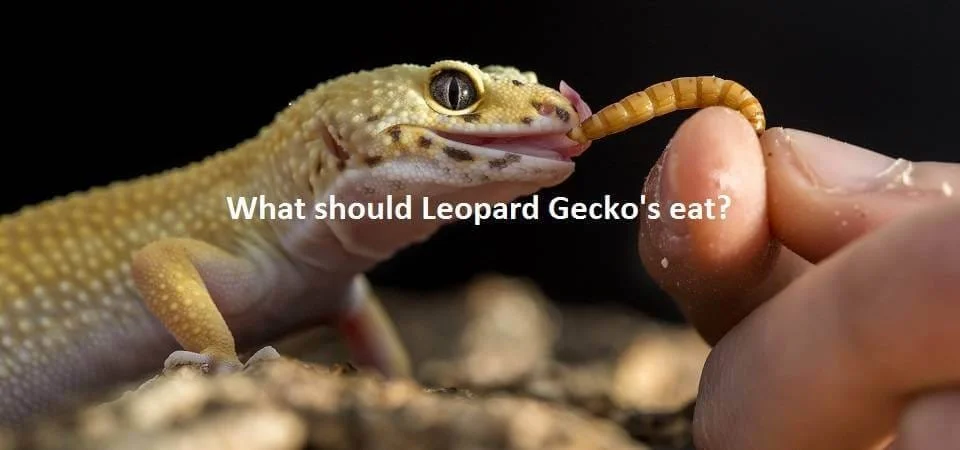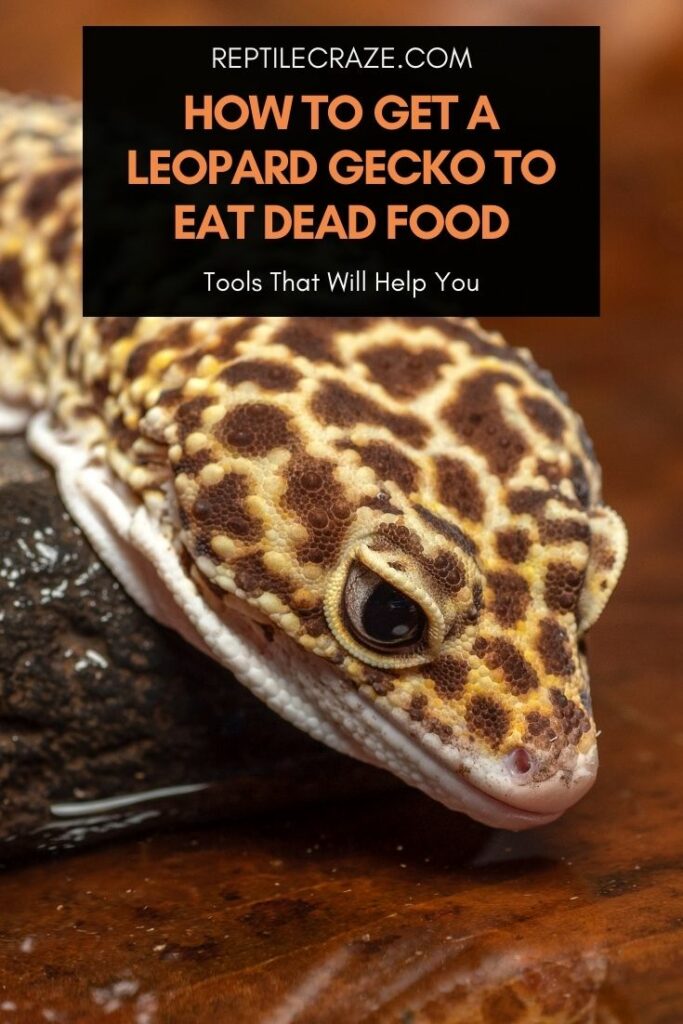Why Can’T Leopard Geckos Eat Dead Crickets

If you’ve ever wondered why leopard geckos can’t eat dead crickets, the answer is simple: they could get sick from the bacteria that can grow on dead insects. While this may not seem like a big deal, it can actually be quite dangerous for your gecko. If you’re not sure whether or not your cricket is still alive, it’s best to err on the side of caution and avoid feeding it to your leopard gecko.
If you’ve ever wondered why leopard geckos can’t eat dead crickets, you’re not alone. It’s a common question from new gecko owners, and it’s understandable given that most reptiles will eat just about anything. So what’s the deal with leopard geckos and dead crickets?
The simple answer is that leopard geckos are insectivores, meaning their diet consists primarily of insects. They are specifically adapted to eating live prey, and their digestive system is not equipped to handle dead or decaying food. In the wild, leopard geckos will only eat insects that they have caught themselves – they won’t touch a carcass.
So why do some people still try to feed their leopard geckos dead crickets? There are a few reasons. First of all, live crickets can be expensive and difficult to keep.
They also tend to escape from their enclosures, which can be frustrating for both the owner and the gecko. Dead crickets are much easier to come by and don’t require any special care, so it seems like an ideal solution.Unfortunately, feeding your leopard gecko dead crickets is actually harmful to their health.
As we mentioned before, their digestive system is not designed for this type of food, and it can cause problems like impaction (where undigested food gets stuck in the intestines). In severe cases, it can even lead to death.So if you’re wondering why leopard geckos can’t eat dead crickets, now you know!

Credit: reptilecraze.com
Is It Ok to Feed Leopard Geckos Dead Crickets?
Yes, leopard geckos can eat dead crickets. In fact, some leopard gecko owners prefer to feed their pets dead crickets because it minimizes the risk of the cricket biting the gecko. However, it is important to make sure that the dead cricket is not too old or decomposed, as this could potentially make your leopard gecko sick.
Can Leopard Geckos Eat Dried Crickets?
Leopard geckos are insectivores, which means that their diet consists primarily of insects. Crickets are a common food source for leopard geckos, and they can be fed either live or dead. Dried crickets are an easy and convenient option for feeding your leopard gecko, but it is important to make sure that the crickets are properly hydrated before feeding them to your reptile.
To do this, simply soak the dried crickets in water for 10-15 minutes before feeding.
Can You Feed Reptiles Dead Crickets?
Yes, you can feed reptiles dead crickets. However, it is important to make sure that the cricket is not too old or too fresh. If the cricket is too old, it may be difficult for the reptile to digest.
If the cricket is too fresh, it may contain harmful bacteria that could make your reptile sick.
Can Crickets Make My Leopard Gecko Sick?
No, crickets cannot make your leopard gecko sick. In fact, crickets are an essential part of a leopard gecko’s diet and provide many nutrients that are necessary for the health of your pet.
Leopard gecko cricket feeding FAQ
Can Leopard Geckos Eat Freeze-Dried Crickets
If you have a leopard gecko, you may be wondering if it’s okay to feed them freeze-dried crickets. The answer is yes! Freeze-dried crickets are a great source of nutrition for leopard geckos and they will love the taste.
There are many benefits to feeding your leopard gecko freeze-dried crickets. They are an excellent source of protein and fat, which are essential for growth and development. Freeze-dried crickets are also easy to digest and won’t upset your gecko’s stomach like live prey can.
When feeding freeze-dried crickets to your leopard gecko, be sure to offer them in moderation. These treats should only make up a small portion of their diet and should not be fed every day. A good rule of thumb is to offer 1-2 freeze-dried crickets per week for every 10 grams of body weight.
Can Crested Geckos Eat Dead Crickets
If you have a pet crestie, you may be wondering if it’s okay to feed them dead crickets. The answer is yes, cresties can eat dead crickets without any problems. In fact, many owners choose to do this because it’s more humane than live-feeding and it’s also less likely to result in escapees!
Here are a few things to keep in mind when feeding your crestie dead crickets:• Make sure the cricket is completely dead before offering it to your gecko. You don’t want to accidentally feed them a live insect!
• Dead crickets can be stored in the refrigerator for up to a week, so feel free to stock up.• There’s no need to gut load or dustdead crickets before feeding them to your pet – they’ll get all the nutrition they need from the cricket itself.• If you’re concerned about hygiene, you can always give the cricket a quick rinse under running water before offering it to your gecko.
Can Leopard Geckos Eat Dead Mealworms
Mealworms are a common food source for leopard geckos, but can these reptiles also eat dead mealworms? The answer is yes, with a few caveats.First, it’s important to understand that leopard geckos are insectivores, meaning that their diet consists primarily of insects.
Mealworms are an excellent source of protein and other nutrients for these lizards.While leopard geckos can technically eat dead mealworms, there are a few reasons why you might not want to feed them to your pet. For one, dead insects may not be as nutritious as live ones.
Additionally, feeding your leopard gecko dead mealworms could encourage it to hunt and eat other animals in the wild (something you definitely don’t want!).If you do decide to feed your leopard gecko dead mealworms, make sure they are fresh and have not been decaying for long. You should also offer them in moderation – no more than a couple per week – as part of a well-rounded diet that includes live insects as well.
Can I Feed My Leopard Gecko Dried Crickets Instead of Live Ones?
Leopard geckos and dried crickets can go together quite well. While live crickets offer more nutrients and hydration, dried ones can serve as a convenient alternative. However, it’s crucial to remember that leopard geckos rely on movement to stimulate their feeding response, so rotating live and dried crickets is recommended.
How Often Do Leopard Geckos Eat
Leopard geckos are one of the most popular reptiles kept as pets. They are easy to care for and make great first pets for reptile enthusiasts of all ages. One of the questions we get asked most often about leopard geckos is, “How often do they need to eat?”
The answer to this question depends on a few factors, such as the age and size of your leopard gecko. Baby and juvenile leopard geckos should be fed every day. Adults can be fed every other day or every three days.
If you are feeding your leopard gecko live food, such as crickets or mealworms, you will need to offer more food items than if you are feeding them pre-packaged foods like Gecko Pro pellets.As a general rule of thumb, offer your leopard gecko as many food items as they can eat in 15 minutes. If they leave food behind, that’s okay – they will eat it later when they get hungry again.
It’s important not to overfeed your leopard gecko as this can lead to health problems down the road. If you have any concerns about how much or how often to feed your pet, please consult with a reptile veterinarian for guidance.
Conclusion
If you’ve ever had a pet leopard gecko, you know that they love to eat crickets. But have you ever wondered why they can’t eat dead crickets? It turns out that there are a few reasons for this.
First of all, dead crickets can harbor bacteria that can make your gecko sick. They can also contain toxins that can be harmful to your gecko. Additionally, eating dead crickets can lead to impaction, which is when food gets stuck in your gecko’s digestive system and can’t be passed properly.
So, if you’re wondering why leopard geckos shouldn’t eat dead crickets, now you know! Be sure to only feed them live insects to keep them healthy and happy.